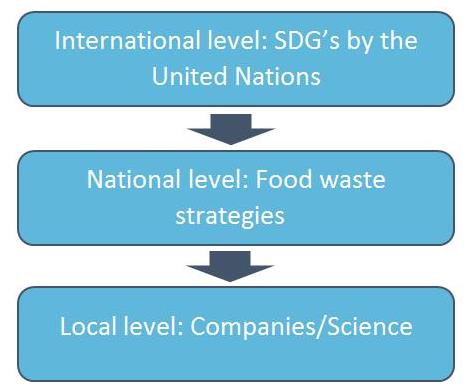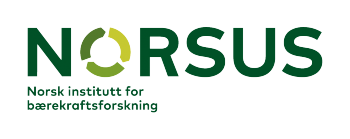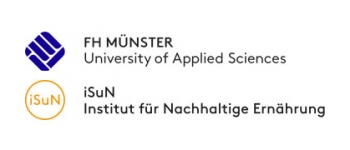WP3 Sustainability assessment
The main aim of WP3 is to assess food waste management solutions recommended from WPs 1 and 2. This will be done using Life Cycle Assessment and similar methodologies to calculate the environmental but also the economic and social impact from different actions preventing or valorising the food waste.
WP1 Best practices for food waste prevention
The project includes case studies in the serving sector in the participating countries.
Reducefoodwaste

The aim of reducing food waste is present on different political levels. Beginning with the Sustainable Development Goals of the United Nations, of which number 12.3 aims to halve the amount of food waste by 2030, also the specialized UN agency Food and Agricultural Organization (FAO) deals with the topic of food waste and food losses. According to the FAO food loss and waste have immense negative environmental impacts on account of water, land, energy and other natural resources used for food that no one consumes. A higher level of processing and refining of the food products or the stage (upstream or downstream) in the food supply chain at which the food is wasted increases the negative impact of food waste or loss.
On a national level a lot of countries do have their own Food Waste Strategies for achieving the objectives of the SDG’s. For example the European countries Germany and Sweden recently renewed and published their strategies on how to halve the amount of food wasted. Other countries do not implemented a specific strategy or national plan for food waste reduction, but deal with the topic in in their National Waste Plans. In Finland the Ministry of the Environment published in 2018 the new edition of the “National Waste Plan to 2023”. Part of it deals with the topic of food waste in Finland.
On local levels different actions take place. Since food waste is directly associated with the loss of financial resources, companies of the out-of-home sector attend to deal with the topic more often. It should be emphasized in particular that the local level which includes companies of the out-of-home catering sector is the most important level, since this is the point where the reduction of waste actually takes place.
Different scientific projects like the European project FUSIONS as well as REFRESH (Resource Efficient Food and dRink for the Entire Supply cHain) analyzed and investigated causes for food waste. Different national projects like the German project ReFoWas (Reduce Food Waste) or the Swedish project Stoppa Matsvinnet were financed by the national food agencies with the aim to reduce food waste.
06 December: Guideline for participation in the voluntary agreement “Reduction of food waste in the out-of-home sector”
With regard to the achievement of the German National Strategy for Food Waste Reduction, dialogue forums for different stages of the supply chain were established.
2021 | Christina Strotmann | Generation and prevention of food waste in the German food service sector in the COVID-19 pandemic – Digital approaches to encounter the pandemic related crisis
Strotmann, Christina; Baur, Vanessa; Börnert, Nora; Gerwin, Paula
28 May 2021: Infosheets for schools and daycare targeting food waste reduction
Within WP5 the German research partner Institute for sustainable Nutrition developed infosheets, aiming to ta
2021 | Christopher Malefors | Food waste in the food service sector
15 January 2021: Ways out of the covid-19 crisis - Results online survey
The Institute of sustainable Nutrition (iSuN) conducted an online survey with catering companies from Germany in October 2020. Results are shown in the factsheet below.
11 January 2021: Invitiation for international workshop series
What is this workshop series about?
18 December 2020: CutFoodWaste2020
NORSUS, the norwegian research partner of the AVARE projekt was able to successfully complete a research project on food waste in the food and catering industry.
2020 | Daniele Matzembacher | Consumer’s food waste in different restaurants configuration: A comparison between different levels of incentive and interaction
Matzembacher, Daniele Eckert; Brancoli, Pedro; Moltene, Laís Maia; Eriksson, Mattias (2020)
2020 | Mattias Eriksson | Quantities and Quantification Methodologies of Food Waste in Swedish Hospitals
Eriksson, Mattias; Malefors, Christopher, Bergström, Pauline; Eriksson, Emelie; Persson Osowski, Christine (2020)
13 May 2020: AVARE online meeting
On the 13th of May the project partners of AVARE came together for the third project meeting.
2020 | Pauline Bergström | Sustainability Assessment of Food Redistribution Initiatives in Sweden
Bergström, Pauline; Malefors, Christopher; Strid, Ingrid; Hanssen, Ole Jørgen; Eriksson, Mattias (2020)
2019 | Mattias Eriksson | What gets measured gets managed – Or does it?
Eriksson, Mattias; Malefors, Christopher; Callewaert, Pieter; Hartikainen, Hanna; Pietiläinen, Oona; Strid, Strid (2019)
09 October 2019: AVARE meeting in Berlin
On the 9th and 10th of October the project partners of AVARE met in Berlin for the second project meeting.
07 October 2019: Survey on food waste by the Institute for sustainable Nutrition
The German research partner Institute for sustainable Nutrition started a survey which examines efficient measurements for reducing
26 April 2019 Presentation: Food waste within the Swedish public sector
The "Conference on Food Waste Prevention and Management" organized by the STREFOWA initiative took place on the 25 and 26th of April in Vienna.
02 April 2019: Presentation "Quantification and actions in food services"
At the Swedish-Brazilian food waste knowledge exchange workshop introduced Mattias Eriksson (SLU) c
06 May 2019: First results of case studies in Germany
The Institute of sustainable Nutrition in Münster (Germany) finished food waste measurements in three schools.
2018 | Mattias Eriksson | The tree structure – A general framework for food waste quantification in food services
Eriksson, Mattias, Persson Osowski, Christine; Björkman, Jesper; Hansson, Emma; Malefors, Christopher; Erikson, Emelie; Ghosh, Ranjan (2018)
2018 | Mattias Eriksson | Mapping of food waste quantification methodologies in the food services of Swedish municipalities
Eriksson, M.; Lindgren, Samuel; Persson Osowski, Christine (2018)
2018 | Mattias Eriksson | Identification and modelling of risk factors for food waste generation in school and pre-school catering units
Stehen, Hjördis; Malefors, Christopher; Röös, Elin, Eriksson, Mattias (2018)
2017 | Mattias Eriksson | From quantification to reduction - identification of food waste reduction strategies in public food services
Malefors, Christopher; Eriksson, Mattias; Persson Osowski, Christine (2017)
2017 | Christina Strotmann | Improving Transfer in the Food Sector by Applying a Target Audience-Centered Approach – The Development of a Nonprofit Marketing Campaign Guide Based on a Case Study of the LAV Platform
Strotmann, Chrsitina; Niepagenkämper, Linda; Göbel, Christine; Flügge, Fara; Friedrich, Silke; Kreyenschmidt, Judith (2017)
2017 | Christina Strotmann | Comparing Food Provided and Wasted before and after Implementing Measures against Food Waste in Three Healthcare Food Service Facilities
Strotmann, Christina; Friedrich, Silke; Kreyenschmidt, Judith; Teitscheid, Petra; Ritter, Guido (2017)
2017 | Christina Strotmann | A Participatory Approach to Minimizing Food Waste in the Food Industry – A Manual for Managers
Strotmann, Christina; Göbel, Christine; Friedrich, Silke; Kreyenschmidt, Judith; Ritter, Guido; Teitscheid, Petra (2017)
2017 | Ole Jørgen Hanssen | Environmental profile, packaging intensity and food waste generation for three types of dinner meals
Hanssen, Ole Jørgen ; Vold, Mie ; Schakenda, Vibeke ; Tufte, Per-Arne ; Möller, Hanne ; Olsen, Nina Veflen et. al. (2017)
20 April 2019: Conference on Food Waste Prevention and Management in Vienna
#reducefoodwaste Organized by STREFOWA “Strategies for reducing food waste in central Europe” this conference will have a look on the complete food supply chain to manage and prevent
Contact
Fachhochschule Münster
Institut für Nachhaltige Ernährung (iSuN)
Corrensstraße 25
48149 Münster
Tel. +49 251 83-65570
isun()fh-muenster()de
ERA-Net SUSFOOD2
The project AVARE "Adding value in resource effective food systems" is a transnational project of the ERA-Net SUSFOOD2, funded by national funding agencies – Ministry of Agriculture and Forestry, Finland, Federal Ministry of Food and Agriculture, Germany, The Research Council of Norway and Formas, The Swedish Research Council – and co-funded by the European Union´s Horizon 2020 research and innovation programme.





